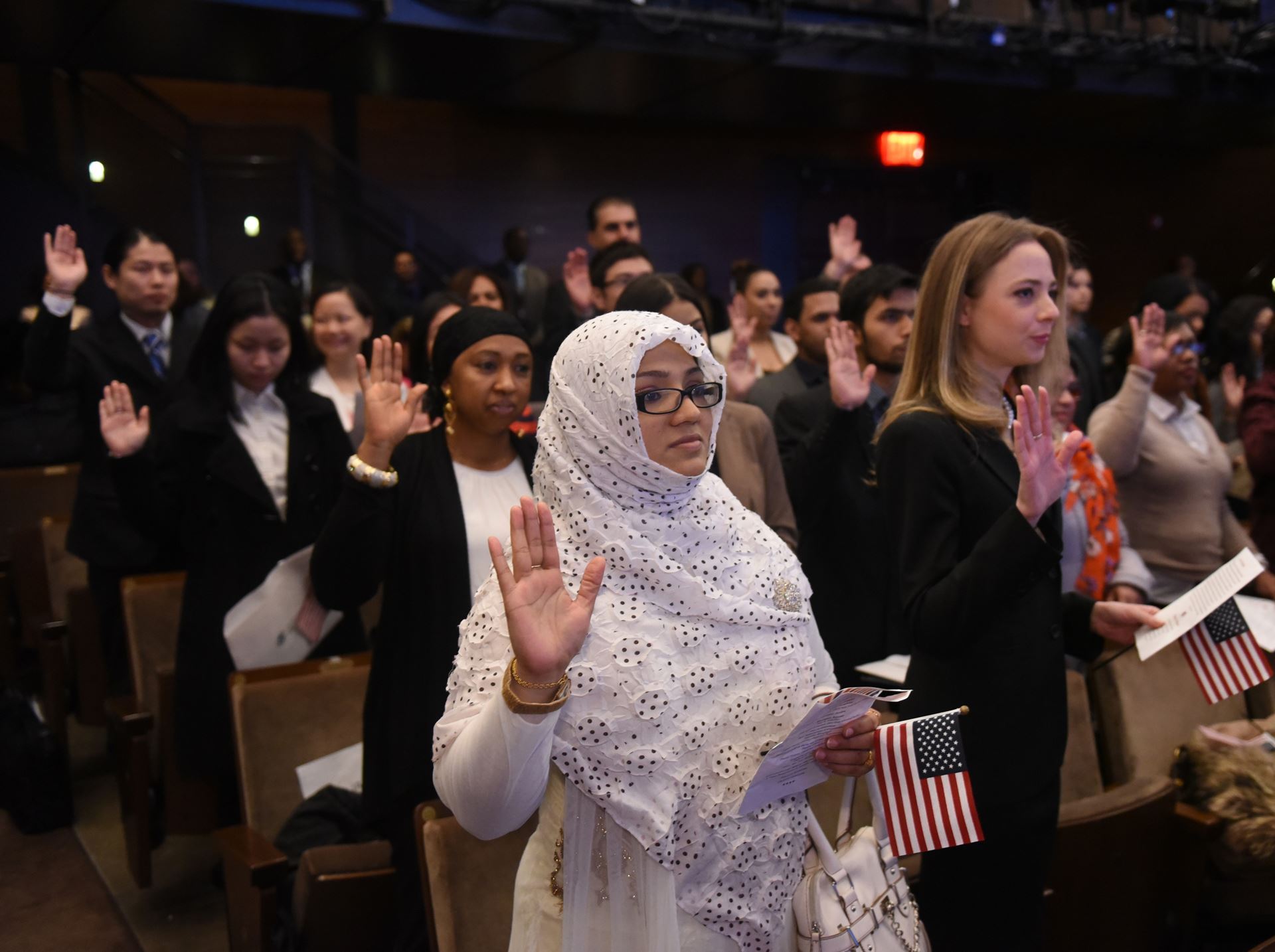“What does it mean to become an American?”
This is the question the New-York Historical Society Museum & Library (N-YHS) posed when they launched the Citizenship Project in response to the change in United States immigration laws in January 2017. The Citizenship Project, which officially launched in July of that same year, is an initiative to help green card holding immigrants living in New York become American citizens. Since last July, the N-YHS has been providing free civics and American history classes and other educational tools for aspiring New Americans, helping them to prepare for the United States Citizenship and Immigration Services (USCIS) naturalization exam.
The idea of marrying the N-YHS’s mission to promote a love for history through education and programming with the USCIS naturalization test was, for the N-YHS, the logical next step in their goal to engage the communities they serve. “We have a long history at the New-York Historical Society of telling untold stories, and we also have a long history of teaching over 200,000 schoolchildren [American history] each year,” says Jennifer Schantz, Executive Vice President and Chief Operating Officer at the N-YHS. Schantz also handles all legal affairs for the N-YHS and oversees the Citizenship Project.
The N-YHS’s long history of preserving New York history and promoting education stretches all the way back to its founding in 1804, when it became the first museum to open in New York State – in fact, their museum predates the founding of the Metropolitan Museum of Art by 70 years. According to their website, the eleven founders of the N-YHS lived through the American Revolution; their experiences living under British occupation led them to believe that “New York’s citizens needed to take decisive action to preserve eyewitness evidence of their own historical moment.” The founders feared that “’dust and obscurity’ would be the inevitable fate of accounts and artifacts if left in the hands of private individuals,” and thus, the N-YHS was born.
Now, the N-YHS is bringing the founders’ original mission of preserving history and telling the American story to the 21st century with the Citizenship Project. “It’s a perfect project for us,” Schantz says.
Here’s a little background behind the core inspiration for the Project – helping aspiring New Americans become citizens: By the end of 2017, there was a backlog of nearly 730,000 pending naturalization applications at the USCIS, according to a report from the National Partnership for New Americans, an alliance of immigrants’ rights groups. In 2017, there were over 925,000 applications for naturalization submitted to the USCIS, the report says. To put that into perspective, the USCIS naturalizes approximately 700-750,000 immigrants as citizens each year; 716,000 New Americans were granted citizenship in 2017.
These numbers are indicative of the times aspiring New Americans are living through – with the change of immigration laws and an increased divide on the debate of immigration to the United States, the pressure to obtain citizenship is higher than ever. But with the help from the N-YHS, the daunting task of applying for citizenship, taking the 100-question exam, and waiting to hear from the USCIS is made easier.
The Citizenship Project is made up of a 24-hour in-depth course that uses art and documents from the N-YHS’s collection to help its students study for the naturalization exam. But the coursework goes beyond rote memorization of American history and civics. Students are introduced to the N-YHS’s collection of objects and documents, giving them the chance to interact with the history they’re studying. “It allows the students to dig deeper, because it doesn’t only address the questions themselves, but also talks about what it means to be a citizen and the rights and obligations of citizenship,” Schantz says. “It’s not lecture; it’s interactive. It’s a really sort of vivid way to make these stories come alive.”

Schantz says that, since the launch of the program in July of last year, her team has taught over 1,000 students to date through the direct services provided in their galleries. Since then, the N-YHS has brought the Project outside of their walls, offering classes off-site. “We find that a lot of people prefer to stay in their neighborhood,” she says. “Our third venture is to develop an online course, so that everyone in the nation, New Americans or even students, can benefit from our collections.”
In addition to their on- and off-site classes and the upcoming online course, the Citizenship Project’s team of educators has also begun offering teacher-training courses in partnership with the USCIS. In April, the N-YHS hosted an all-day training with the USCIS for other community organizations and museums who wanted to bring the educational methods the Citizenship Project’s educators use in their own programs.

The impact the Citizenship Project has had on the N-YHS’ community has been tremendous, according to Schantz. Last year, the N-YHS hosted two naturalization ceremonies in their galleries, one of which was presided over by Supreme Court Justice Ruth Bader Ginsberg, who had reached out personally to ask if she could participate. “It was a wonderful day,” Schantz says. “The new citizens were so proud to be in the audience and to hear her speak and talk about how meaningful it is to become an American.”

For Schantz, the Citizenship Project is a true reflection of the N-YHS’ primary goal as a cultural institution. “Our mission is to make history matter, or ‘because history matters,’” she says. “I think that the most effective programs are those that adhere to the vision and mission of the institution, and so what’s beautiful about the Citizenship Project is that we’re doing what we do best – teaching American history and making history matter.”
Photos courtesy of Don Pollard.
